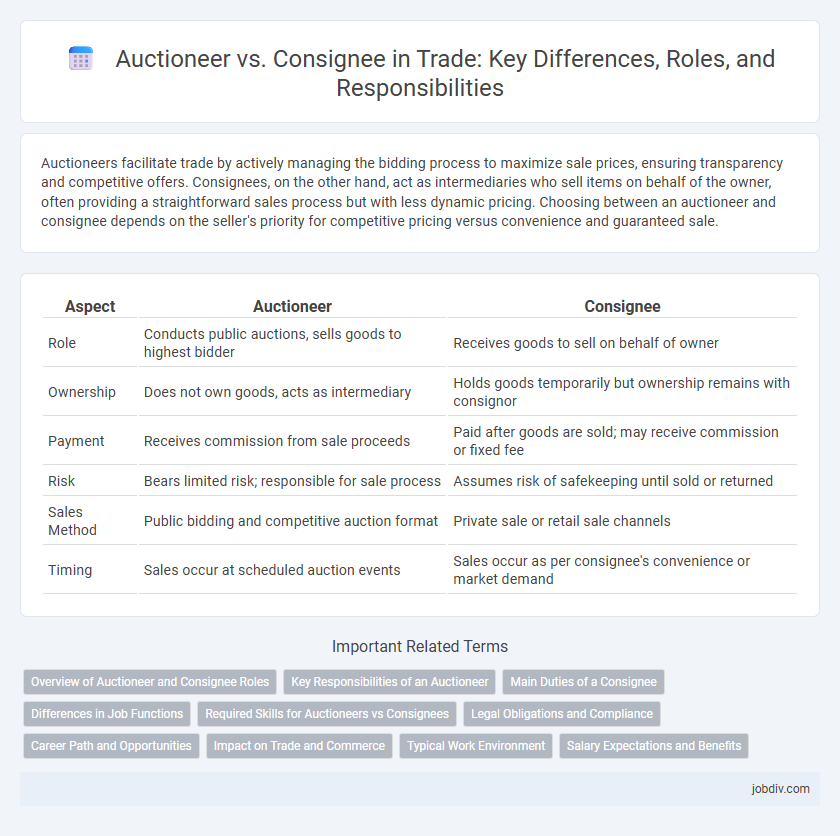Auctioneers facilitate trade by actively managing the bidding process to maximize sale prices, ensuring transparency and competitive offers. Consignees, on the other hand, act as intermediaries who sell items on behalf of the owner, often providing a straightforward sales process but with less dynamic pricing. Choosing between an auctioneer and consignee depends on the seller's priority for competitive pricing versus convenience and guaranteed sale.
Table of Comparison
| Aspect | Auctioneer | Consignee |
|---|---|---|
| Role | Conducts public auctions, sells goods to highest bidder | Receives goods to sell on behalf of owner |
| Ownership | Does not own goods, acts as intermediary | Holds goods temporarily but ownership remains with consignor |
| Payment | Receives commission from sale proceeds | Paid after goods are sold; may receive commission or fixed fee |
| Risk | Bears limited risk; responsible for sale process | Assumes risk of safekeeping until sold or returned |
| Sales Method | Public bidding and competitive auction format | Private sale or retail sale channels |
| Timing | Sales occur at scheduled auction events | Sales occur as per consignee's convenience or market demand |
Overview of Auctioneer and Consignee Roles
An auctioneer facilitates the sale of goods by managing the bidding process and ensuring transparent transactions between buyers and sellers, playing a crucial role in maximizing value. The consignee is the party designated to receive goods in a shipment, often responsible for holding the items before auction or resale, and may coordinate logistics and payment processing. Understanding the distinct responsibilities of auctioneers and consignees is essential for efficient trade operations, particularly in auction-based sales.
Key Responsibilities of an Auctioneer
An auctioneer's key responsibilities include managing the bidding process, ensuring transparent and fair competition, and accurately recording sale prices. They also verify the authenticity of goods, facilitate smooth transactions between sellers and buyers, and comply with relevant trade regulations. Effective communication and prompt resolution of disputes are critical to maintaining trust and maximizing seller revenue during auctions.
Main Duties of a Consignee
The consignee in trade is primarily responsible for receiving and taking possession of goods shipped by the seller, ensuring all items match the purchase order and inspecting for damages or discrepancies upon arrival. They manage the documentation related to the shipment, such as bills of lading and delivery receipts, to verify legal transfer of ownership and facilitate customs clearance. Consignees also coordinate with carriers and warehouses to store or distribute goods effectively, ensuring smooth logistics and inventory management.
Differences in Job Functions
An auctioneer is responsible for conducting auctions by managing bids and ensuring legal compliance, while a consignee primarily handles the receipt and distribution of goods in shipping transactions. Auctioneers facilitate competitive bidding and determine final sale prices, whereas consignees manage inventory and coordinate logistics upon goods arrival. These distinct roles emphasize the auctioneer's focus on sales execution and the consignee's role in supply chain operations.
Required Skills for Auctioneers vs Consignees
Auctioneers need exceptional public speaking skills, quick decision-making abilities, and deep knowledge of market trends to effectively conduct auctions and maximize sales. Consignees require strong negotiation skills, inventory management expertise, and an understanding of legal contracts to ensure proper handling and sale of goods on behalf of consignors. Both roles demand attention to detail and financial acumen, but auctioneers emphasize persuasive communication while consignees focus on logistical coordination.
Legal Obligations and Compliance
Auctioneers hold legal obligations to conduct transparent, fair auctions in compliance with regulatory standards, ensuring accurate bidding records and timely payment settlements. Consignees are responsible for providing the auctioneer with valid and complete ownership documentation and adhering to contractual terms related to goods consigned for sale. Both parties must comply with jurisdiction-specific trade laws and taxation requirements to avoid contracts' nullification or penalties.
Career Path and Opportunities
Auctioneers often develop strong negotiation and public speaking skills, leading to career opportunities in sales management, estate liquidation, and event coordination. Consignees typically gain expertise in logistics, inventory management, and customer relations, opening pathways to supply chain management and retail operations roles. Both career paths offer growth potential in trade, with auctioneers leaning towards sales-driven opportunities and consignees favoring operational and managerial positions.
Impact on Trade and Commerce
Auctioneers facilitate the sale of goods by conducting public sales, driving competitive bidding that can increase market prices and liquidity, which benefits trade efficiency. Consignees act as intermediaries holding goods on behalf of consignors, enabling smoother distribution channels but potentially slowing cash flow due to payment terms tied to sale completion. The distinct roles of auctioneers and consignees significantly influence trade dynamics by affecting timing, pricing strategies, and risk management in commercial transactions.
Typical Work Environment
Auctioneers typically operate in bustling auction houses or large event venues where they manage live bidding processes, ensuring transparency and efficiency in sales transactions. Consignees often work in warehouses or logistic centers, overseeing inventory management and coordination between sellers and buyers to facilitate smooth trade operations. The dynamic auction environment contrasts with the consignee's more stationary and administrative setting, reflecting distinct roles in trade execution.
Salary Expectations and Benefits
Auctioneers typically command higher salaries due to their specialized skills in conducting sales and driving competitive bidding, with average earnings ranging from $50,000 to $100,000 per year depending on experience and location. Consignees usually earn lower base salaries, often between $30,000 and $60,000 annually, supplemented by commissions or fees based on goods sold or auction proceeds. Benefits for auctioneers often include performance bonuses, flexible schedules, and travel allowances, while consignees may receive standard industry benefits such as health insurance, retirement plans, and commission-based incentives.
Auctioneer vs Consignee Infographic

 jobdiv.com
jobdiv.com